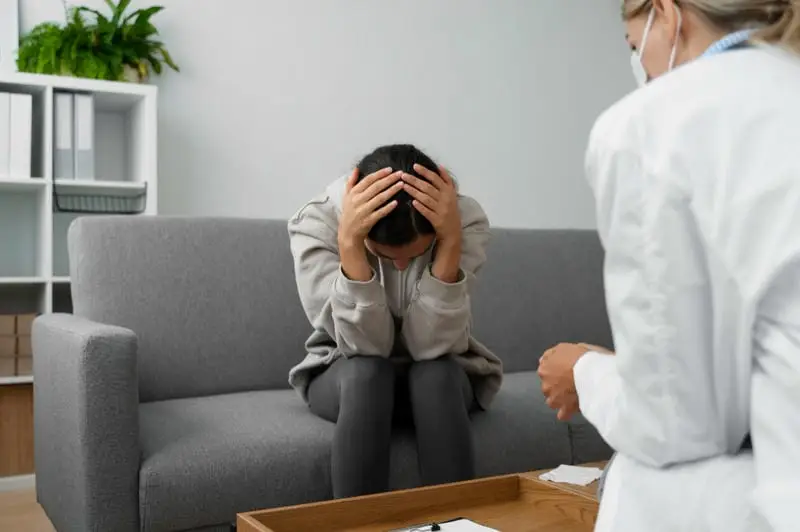- Published on: Sep 27, 2023
- 2 minute read
- By: Secondmedic Expert
Stress At Work And Mental Health: Uncovering The Connection
Introduction
In today's fast-paced world, the intersection of workplace stress and mental health is a critical issue that affects many of us. This article delves into this relationship, offering insights and actionable tips to help you manage workplace stress effectively. Let's explore how the demands of the modern workplace can impact your mental well-being and provide strategies to address these challenges.
Understanding the Impact of Workplace Stress
The Daily Grind: An Unrelenting Strain
Modern work environments often demand long hours and adherence to tight deadlines. This relentless pace can create a constant sense of pressure, leading to stress, anxiety, and even burnout. It's crucial to recognize the signs of workplace stress early to prevent it from becoming overwhelming.
Commute Blues: A Hidden Stressor
The daily commute is a reality for many, and it can significantly contribute to your overall stress levels. Whether you're stuck in traffic or crammed into a crowded train, the commute can drain your energy and set a stressful tone for the day.
Navigating Office Dynamics
Workplaces aren't always serene sanctuaries. Office politics, conflicts with colleagues or superiors, and the pressure to perform can add an emotional burden to your work life. These factors can exacerbate stress and negatively impact your mental health.
The Toll on Your Mental Health
Anxiety and Depression: Silent Struggles
Prolonged exposure to workplace stress can lead to anxiety and depression. The incessant pressure and demands can make you feel overwhelmed, trapped, and emotionally drained. Recognizing these mental health challenges is essential for seeking timely help and support.
Physical Health Consequences
Stress doesn't only affect your mind; it can manifest in various physical health issues. From persistent headaches and sleep disturbances to more severe conditions like heart disease and weakened immune systems, the toll on your body is real.
Coping Mechanisms Gone Awry
Unfortunately, some individuals resort to unhealthy coping mechanisms such as substance abuse as a way to deal with work-related stress. These behaviors can compound mental health issues and lead to addiction.
Strategies for Coping with Workplace Stress
Breaking It Down: Prioritization
When faced with an overwhelming workload, break tasks into smaller, manageable components. Prioritize these tasks, tackle them one by one, and take a moment to celebrate your achievements. This approach can help you regain a sense of control.
Embrace Regular Breaks
Don't underestimate the importance of breaks during your workday. Coffee breaks, short walks, or simply stepping away from your desk can recharge your mental batteries and boost productivity.
Establishing Boundaries
In the age of smartphones and constant connectivity, setting clear boundaries between work and personal life is crucial. Inform your employer and colleagues about your limits, ensuring that work-related matters do not encroach on your personal time.
Seek Support and Communicate
Bottling up stress is counterproductive. Reach out to friends, family, or a professional therapist to discuss your challenges. Engaging in open and honest conversations can provide relief and offer valuable perspectives.
The Role of Employers in Promoting Mental Well-being
Embracing Flexibility
Employers can contribute significantly to their employees' mental health by offering flexible work arrangements. Options such as remote work or flexible hours can empower individuals to better manage their stress.
Employee Assistance Programs (EAPs)
Many companies provide Employee Assistance Programs (EAPs) that grant access to counseling and mental health resources. Employees should be encouraged to utilize these valuable services when needed.
Cultivating Work-Life Balance
Fostering a workplace culture that prioritizes work-life balance is essential. Encouraging employees to take their allotted vacation time, promoting stress management techniques, and offering wellness programs can create a healthier and more productive work environment.
In Conclusion
In a world where a substantial portion of our lives is devoted to work, understanding the connection between workplace stress and mental health is vital. Ignoring this relationship can lead to severe consequences for both individuals and organizations. It is essential to take proactive steps to manage workplace stress and prioritize mental well-being.
Remember that seeking help and making necessary changes in your work life is a sign of strength, not weakness. Your mental health is a precious asset, and by taking action, you can regain control, achieve a healthier work-life balance, and ultimately lead a more fulfilling and stress-free life. Here's to your mental well-being and a brighter, more resilient future.
Read FAQs
A. Common signs of workplace stress include persistent fatigue, increased irritability, difficulty concentrating, changes in sleep patterns, and physical symptoms like headaches or stomachaches. If you notice these signs, it's essential to address them to prevent more severe mental health issues.
A. To achieve a healthier work-life balance, start by setting clear boundaries between work and personal life. Prioritize self-care, take regular breaks, and utilize your vacation time. Communicate your limits to your employer and consider flexible work arrangements if available.
A. If you suspect you're experiencing workplace stress-related anxiety or depression, seek professional help. Reach out to a therapist or counselor who specializes in mental health. Don't hesitate to talk to friends and family for support as well.









